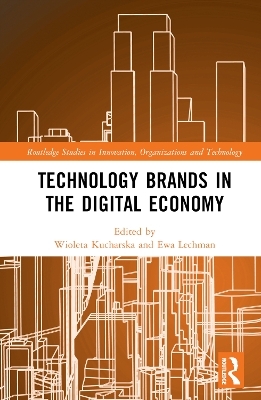
Technology Brands in the Digital Economy
Routledge (Verlag)
978-1-032-02686-2 (ISBN)
The book contributes to the present state of knowledge, offering the reader broad evidence on how digital technologies impact the process of high-tech brands' nascence and how their growing role and global exposure influence networked economies and societies. It sets out to deliver a bridge between brand management and economical approaches to understanding how digital technologies and high-tech brands are interrelated. This multidisciplinary approach creates a complex compilation of different views and perspectives that sheds new light on the high-tech brands' phenomena of being an input and output of technology-driven economies.
Technology Brands in the Digital Economy is written for scholars and researchers from a wide variety of disciplines but especially for those addressing issues of brands and economic development and growth, social development, and the role of technological progress in broadly defined socio-economic progress. It will also be an invaluable source of knowledge for graduate and postgraduate students in a variety of areas such as economic and social development, information and technology, worldwide studies, social policy, and comparative economics.
Wioleta Kucharska is a professor in the Management Department of the Faculty of Management and Economics, Gdańsk University of Technology, Poland. She has 12 years of industrial experience in marketing management. Her latest book, Personal Branding in the Knowledge Economy: The Interrelationship Between Corporate and Employee Brands, published in 2022 by Routledge, provides a comprehensive picture of the phenomenon of personal branding in the network economy era by combining a solid scientific frame with branding practice. Ewa Lechman is a professor of economics at the Faculty of Management and Economics, Gdańsk University of Technology, Poland. Since 2017, she has been Vice-Dean for Development and a PhD programme director. Her extensive research interests concentrate on economic development, ICT and technological progress, and ICT role in reshaping social and economic systems and various aspects of poverty and economics in developing countries.
Introductory words
Wioleta Kucharska & Ewa Lechman
Chapter 1: Technology brands in the digitally-based and network economy: setting the background
Wioleta Kucharska & Ewa Lechman
Chapter 2: The History of Technology Brand Emergence
Hasret Balcioglu
Chapter 3: A network approach to value creation from intangible assets
Anna Ujwary-Gil
Chapter 4: Explaining the tech brand value with economic-financial and stock market information: the booming digital economy
María Ángeles Alcaide González, Elena De La Poza Plaza, Natividad Guadalajara Olmeda
Chapter 5: Exploring the Effects of Digital Business Strategies and Technology Scanning on Company Performance
Minna Saunila, Juhani Ukko, Mina Nasiri, Tero Rantala, Sariseelia Sore
Chapter 6: Assessing Technology Brands with Digital Media,
G. Scott Erickson
Chapter 7: Technology brands and the role of GenZ in their co-creation: Case study of Serbia
Tatjana Mamula Nikolić, Sanja Popović – Pantić, Karolina Perčić
Chapter 8: Place branding and social media in the sharing economy: a literature review
Abdullah M. Alahmari, Bruno Schivinski, Xiufang (Leah) Li.
Index
| Erscheinungsdatum | 20.02.2023 |
|---|---|
| Reihe/Serie | Routledge Studies in Innovation, Organizations and Technology |
| Zusatzinfo | 20 Tables, black and white; 15 Line drawings, black and white; 15 Illustrations, black and white |
| Verlagsort | London |
| Sprache | englisch |
| Maße | 156 x 234 mm |
| Gewicht | 453 g |
| Themenwelt | Wirtschaft ► Betriebswirtschaft / Management ► Marketing / Vertrieb |
| Wirtschaft ► Betriebswirtschaft / Management ► Unternehmensführung / Management | |
| Wirtschaft ► Betriebswirtschaft / Management ► Wirtschaftsinformatik | |
| Wirtschaft ► Volkswirtschaftslehre | |
| ISBN-10 | 1-032-02686-3 / 1032026863 |
| ISBN-13 | 978-1-032-02686-2 / 9781032026862 |
| Zustand | Neuware |
| Haben Sie eine Frage zum Produkt? |
aus dem Bereich


